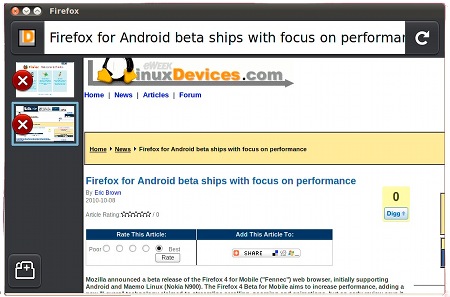Linux lovers riled up over Sony PS3 lawsuit, Firefox woes
Jan 20, 2011 — by Eric Brown — from the LinuxDevices Archive — 1 viewsThe Linux blogosphere is “all shook up” these days, skewering Sony for suing a hacker for jailbreaking the PS3, and hammering Mozilla for skimping on hardware acceleration in the Linux Firefox 4 beta. Meanwhile, Google's decision to drop H.264 from its Chrome browser for open source alternatives received praise from the open source world, but also a surprising amount of criticism.
The open source Linux community has had plenty to talk and argue about in recent weeks — and we're not even talking about Canonical's recent decisions to embrace Qt, dump X Window in favor of Wayland, and favor its own Unity UI layer over GNOME.
 Generating the greatest outrage is a familiar villain: Sony. The PlayStation 3 v3.55 received a jailbreak courtesy of George Hotz (better known as GeoHot) on Jan. 7, enabling users to once again run Linux on the game player. Last week, Sony filed a lawsuit against the hacker, as described in this Wired report.
Generating the greatest outrage is a familiar villain: Sony. The PlayStation 3 v3.55 received a jailbreak courtesy of George Hotz (better known as GeoHot) on Jan. 7, enabling users to once again run Linux on the game player. Last week, Sony filed a lawsuit against the hacker, as described in this Wired report.
Hotz vowed to create the root-level firmware hack last year, after Sony announced that a 3.21 update due on April 1 would prohibit the installation of alternate OSes due to security concerns. Sony held true to its promise, and the four-year run of loading Linux distros on the gaming box came to an end.
Later that month, however, Geohot showed how he planned to defeat Sony's Linux lock-out. Shortly afterward, at least three class-action lawsuits were filed against Sony.
Sony also received complaints from the U.S. Air Force Research Laboratory and other research institutes, which had been using arrays of PS3s for high-performance computing research until the lock-out. Yet, the PS3 continued to plug away Linux-free until GeoHot released his CFW (custom firmware) hack this month.
Sony's  federal suit, filed in San Francisco against Hotz (pictured at left in a Wired shot) and his collaborators, alleged that Hotz accessed the PS3's root keys ("metldr keys") "effectively tricking the PS3 system into running unauthorized programs."
federal suit, filed in San Francisco against Hotz (pictured at left in a Wired shot) and his collaborators, alleged that Hotz accessed the PS3's root keys ("metldr keys") "effectively tricking the PS3 system into running unauthorized programs."
Sony claims the jailbreak violates the U.S. Digital Millennium Copyright Act (DMCA) and other laws, as well as the Computer Fraud and Abuse Act, and is seeking unspecified monetary damages.
According to Wired, the suit "highlights the inconsistencies of the DMCA." For example, in July, the U.S. Copyright Office legalized Hotz' jailbreaking of the Apple iPhone, suggesting that the defendants may have some legal precedent on their side.
Sony sues, the EFF stews
As with the recent WikiLeaks dumps, GeoHot's PS3 code "is everywhere on the internet, and could never be removed from all its corners," says Wired. This week, the Electronic Frontier Foundation (EFF) made the same point, suggesting the lawsuit was pointless except as a means to scare away other potential hackers.
While the DMCA claims are certainly open to question, considering the iPhone ruling, the Computer Fraud and Abuse Act claims, which carry potential criminal charges, are "outrageous," says the EFF.
Sony is arguing that the hackers violated the agreement that Sony imposes on users of its network, despite the fact that they clearly did not use Sony's network, but rather used the consoles they bought with their own money, says the EFF.
"Simply put, Sony claims that it's illegal for users to access their own computers in a way that Sony doesn't like," says the EFF. "Sony is sending another dangerous message: that it has rights in the computer it sells you even after you buy it, and therefore can decide whether your tinkering with that computer is legal or not. We disagree. Once you buy a computer, it's yours."
The EFF concludes that Sony's core arguments are "both sweeping and frightening, and not just for gamers and computer researchers."
Meanwhile, on Salon.com Dan Gillmor calls out Sony for being particularly "loathsome in its behavior" against its customers.
"Sony is not the only technology company to abuse the legal system," he writes. "But Sony has shown deeper disrespect for its customers than most others."
Despite the fact that "some of Sony's hardware is best-of-breed," according to Gillmor, he will be "buying none of Sony's gear, no matter how good it is, until the company stops treating the rest of us like chattel instead of customers."
George Hotz demonstrating his PS3 jailbreak on YouTube
Source: GeoHot
(Click to play)
Firefox beta places Linux low on the totem pole
Unlike the PS3 jailbreak issue, the recent Firefox 4 beta dust-up invokes no great legal questions, but it certainly points to an irony: Why is it that the non-profit Mozilla Foundation won't invest more of an effort to please its open source Linux customers?
As TopTechReviews.net explains it in a story today, the final beta version of the Firefox 4 web browser was released last Friday with several bug fixes and new features. "but Linux users were not rejoicing about the launch."

Firefox 4 for Mobile running on a Ubuntu desktop
"As of press time, only Nvidia's driver has been on the white-list while other drivers have bugs and other issues," says the story. Mozilla developers have said that GL-accelerated rendering on the Linux beta is on hold, and they're asking for help from Linux distro projects and Xorg to look for bug workarounds.
Meanwhile, the final Firefox 4 is said to be due around the end of February. Mobile versions of Firefox 4 ("Fennec") were released in beta versions in October for Maemo Linux, as well as the Linux-based Android, but have yet to be released in "final"versions.
Google's H.264 banishment: Split decision?
Also roiling the open source world, as well as the video and tech industry at large, was Google's Jan. 11 announcement that it was canning support for the H.264 video codec from its Chrome browser in favor of the open source WebM and Theora codecs.
Chrome, which is available for all major desktop OSes, including Linux, also forms the basis of Google's Linux-based Chrome OS, and is matched with Android in the Google TV platform.
According to Google Chrome Product Manager Mike Jazayeri, Theora, as well as the Google-backed WebM, which debuted with a related open source VP8 video compression format in Android 2.3, "hew more closely to the search engine's HTML5 goals."
While other open source codecs would also be considered for future inclusion, the proprietary H.264 will not be among them, he added. "Though H.264 plays an important role in video, as our goal is to enable open innovation, support for the codec will be removed and our resources directed towards completely open codec technologies," stated Jazayeri.
At our sister publication eWEEK, Clint Boulton followed up on Jan. 15, reporting on Google's subsequent clarifying statements. According to Jazayeri, one of the key reasons it was dropping H.264 was that Google refused to accept the licensing requirements imposed by H.264 proprietor and licensing firm MPEG LA.
However, Google will continue to support other proprietary formats, including the Adobe Flash and Microsoft Silverlight plug-ins, both of which facilitate H.264 videos in web applications, Jazayeri said.
According to Boulton, Google's move has "elicited concern from publishers and developers concerned they would have to maintain multiple copies of their content if Google canned support for the industry standard H.264 format." Meanwhile, "others saw Google's claim of 'openness' as a ruse to push its own WebM codec, which the company cultivated after acquiring On2 Technologies for $124.6 million in 2009," he added.
The story goes on to note that Google, Microsoft, and Apple have all been on board for H.264, while Mozilla and Opera have supported the open source WebM and Theora codecs. By switching sides, Google has become a "tie breaker," writes Boulton. Yet, the result is that "all publishers and developers using the "video" tag must support multiple formats, a major inconvenience that leads to fragmentation," he adds.
eWEEK sums up some of the debate, suggesting that both a critique of Google's move by Ars Technica's Peter Bright as "a step backward for openness," and the vigorous defense from Opera' Software's "Haarvard" make good points.
Perhaps the biggest argument against the H.264 banishment is the potential effect it will have on HTML5, says the story. Boulton quotes IDC analyst Al Hilwa as saying HTML5 will be harmed "because it may never have a standard codec" as a result of the fragmentation.
Today, LinuxInsider's Katherine Noyes followed up with more play-by-play, focusing on the debate within the Linux community. While most forum responses to Google's move were understandably favorable, there was a surprising amount of dissent, she notes.
Naysayers included SlashDot blogger "hairyfeet," who writes, "This is about the worst decision they could have made! It will kill the HTML V5 video tag dead! Why? Because web developers aren't gonna deal with having to deal with a divided web, with half only being able to use one, and half another."
The end result, will be "the overwhelming triumph of Flash!" he adds. "All they did was to ensure Linux users will continue to have a lousy experience via bad Flash support while giving Adobe the keys to the kingdom."
On the pro side, there were many comments such as this one from blogger Barbara Hudson: "Google is complying with the spirit of the spec more than the H.264 proponents, who are pushing a proprietary solution that favors the rent-seekers and toll-keepers over consumers," writes Hudson. "Google is doing the right thing, both by the spec, and by consumers."
Echoing this, reports Noyes, is blogger Robert Pogson, who writes, "The world should use open standards and Free Software to really enjoy IT and get the best out of IT — the world does not need corporations that sell us handcuffs to enslave us."
FOSS on the move
Finally, despite all the threats against open source software, it has been remarkably successful in recent years and shows no sign of abating, writes Mark Hinkle in a new NetworkWorld blog called The Fountainhead.
Among the many stats compiled by Hinkle include:
- SourceForge.net hosts over 260,000 projects developed by 2.7 million developers.
- Google's open source Chrome holds 8 to 10 percent market share of the web browser market, while Firefox holds 31 percent.
- Demand for Linux servers continues to grow and represents 17.5 percent of all server revenue.
- Android has surpassed BlackBerry in overall mobile operating system market share and over the 2010 holiday season, grew faster than Apple iOS.
This article was originally published on LinuxDevices.com and has been donated to the open source community by QuinStreet Inc. Please visit LinuxToday.com for up-to-date news and articles about Linux and open source.